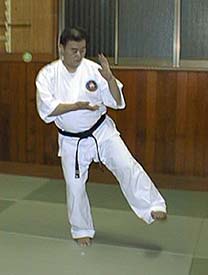Budo - A Double Edged Sword

By Uematsu Yoshiyuki (Tesshu)
Budo must be like a double edged sword, kindness and strictness.
When you get stronger, you also naturally get kinder.
Back in the era when swords were considered essential, "Bunbu Ryodo"
(the twin paths of the sword and the pen) was a requirement for the elite.
Rephrasing it in more modern terms, it would probably describe a student
who gets good grades and also excels in sports. But there is a difference
between sports and budo.
Generally speaking, people's image of sports is healthy. Working up a
good, satisfying sweat. Budo also has this quality, but behind that there
is the sense of death. Unlike sports, if one "loses" in a confrontation,
it can mean death. So there is a kind of omote (surface) and ura (behind
the surface). This is the origin of budo. However, one cannot bring this
to the surface. So many of today's budo are becoming mere sports. Tournaments
and matches are the omote aspect, a kind of competition to show the efforts
of one's practice. The ura aspect is not for show, but the pursuit of
only victory.
If you said this you might give an impression of brutality, but if your
technique doesn't work in a real confrontation, why even bother with budo?
If one doesn't have the confidence to defend oneself, which is the original
purpose of the martial arts, then one will just get swept away.
There seem to be a lot of people who do not understand this, and open
their dojos just on a whim. That is why at our dojo, we teach not only
the techniques, but also the true purpose and history of budo to the beginners.
They seem to improve rapidly. If we just have them learn by mimicking
the instructors, it becomes too easygoing. On the other hand, it is best
to turn away those who come to learn for sinister purposes. I am referring
to those people who, no matter how well we teach them, always seem to
go off on a dangerous tangent. Budo is not for those kind of people.
 Real
budo is not an offensive art, but rather teaches the importance of courtesy,
love and kindness. But, if it comes down to the line, one must not forget
the feeling of an eye for an eye, a tooth for a tooth. Budo is thus a
double edged sword, strictness and gentleness. Real
budo is not an offensive art, but rather teaches the importance of courtesy,
love and kindness. But, if it comes down to the line, one must not forget
the feeling of an eye for an eye, a tooth for a tooth. Budo is thus a
double edged sword, strictness and gentleness.
Through budo one also gains much more than just muscular strength by
"growing strong." If one is weak, one will constantly be running
away (from challenges), showing nothing but his back to others. In order
to face forward and press on, one must become strong. By growing strong,
one also grows compassionate. I think that budo is very useful for widening
one's mental perspective.
People also say that the martial arts are a way of relieving stress,
but the idea is too fixed in some people's minds. They can also be harmful.
Budo seems to have two sides to everything. The two sides are not separate,
but the plate of budo seems to be big enough for both extremes. It depends
on how you use it. When your are exhausted, for example, you shouldn't
exercise. Also, if you brood over exercising, this adds stress rather
than reducing it. In these circumstances it is best to practice Taijiquan
or soft Qigong. They can be done while relaxing and they help reduce exhaustion.
About The Author
Uematsu Yoshiyuki (Tesshu) is Chief Instructor of Mushinkan Karate Kobudo
Dojo in Kanazawa, Japan. He also teaches iaido and is an accomplished
painter, calligrapher and woodcarver. At age 9 he began Zen training at
Shofukuji Temple in Saga Prefecture, where his uncle Mori Goho was the
head priest. He began training in budo the next year, also under Mori,
who taught Shoreiryu Karate Kobudo as well as classical Japanese martial
arts. He entered the Sojiji Temple in Monzen, Ishikawa Prefecture in 1971,
and at age 24, opened the Mushinkan Dojo and has worked to promote budo
in Ishikawa Prefecture.
|